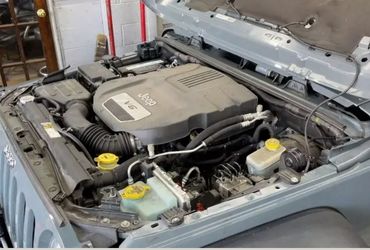
People know Jeeps for giving a fun and adventurous driving experience. Whether they cruise with the top down or tackle off-road terrain. However, some people have found Jeep models to have a recurring issue with a loud ticking noise coming from the engine bay. So you might be thinking that why is my jeep making a ticking noise?
Does the ticking noise increase in volume as the engine warms up? If your Jeep just started making a clicking sound that gets louder as the engine heats up. The engine or its components cause the noise. This article will explore the causes of this ticking noise in Jeeps, the symptoms to look for, and potential solutions for addressing the issue.
So let’s find out the answer to your question- why is my jeep making a ticking noise?
What is Jeep Ticking Noise?
A variety of different components can cause a ticking noise from the engine bay of your Jeep. Inspecting the engine and replicating the sound is vital to identify the noise source. The valve train is frequently the source of internal ticking sounds originating from the engine bay. This contains the rocker arms, lifters, push rods, lifters, camshaft, and other cylinder head parts. The issue of oil buildup in the valvetrain, which results in noise and friction between the lifters and the drivetrain, is another issue.
People can also hear an exhaust leak’s exterior ticking noise. This is caused by a bad exhaust manifold gasket, a sloppy heat shield, or other worn-out components.
By identifying the source of the noise, you can take the appropriate steps to fix it.
Why Should Jeep Ticking Noises Be Taken Seriously?
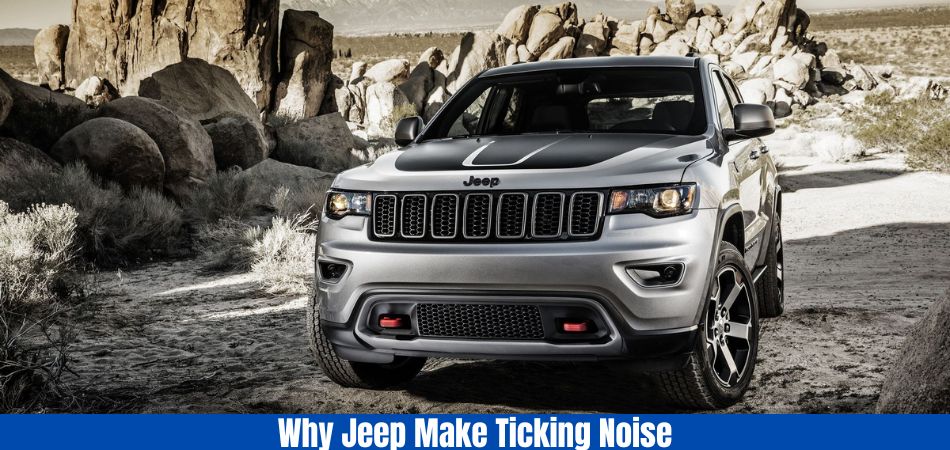
Vehicles can experience a variety of problems, some more serious than others. It’s important to take any vehicle-related issues seriously, as driving a problematic vehicle can put everyone inside and other drivers at risk.
If this is the first issue with your Jeep, it’s a good idea to check the warranty and contact the manufacturer. Furthermore, if the warranty is still valid, it can help save money on repairs. And if the warranty has expired, it’s best to contact a mechanic for further assistance.
What Are the Symptoms of Jeep Ticking Noise?
- The following are some of the symptoms:
- There is a sound similar to that of a pen tapping or clicking
- When traveling at a slower speed, it is most audible
- When driving near a tunnel or wall, this is most apparent
- The clicking/ticking is synchronized with the engine RPM
- When the wheel is rotated, a clicking or ticking sound is heard
- As the speed increases, the noise dissipates somewhat
Why Is My Jeep Making A Ticking Noise? Causes!
1. Valvetrain Problems
The first thing you should do if you hear a ticking noise coming from your Jeep is to examine the valvetrain. Hydraulic valve lifters are a standard feature of most automatic transmissions. Incorrect pressure might result in problems between the lifters and the drivetrain. Which can cause worrying tapping sounds.
Although the constant ticking of a Jeep lifter is unpleasant, it is not dangerous. Use cold oil at startup to assist in pumping up the lifters as a solution to this problem. If doing so resolves the issue, the oil’s temperature is probably to blame. Most of the time, The oil breaking down will eliminate the noise after more than a thousand kilometers. But if it doesn’t, that can be a symptom of a much more serious issue with the car.
2. The Wrong Air Filter is Being Used
Incorrect air filter usage in a vehicle can lead to ticking noises and other issues. To prevent this, check that the correct filter is being used when you open the hood. It’s often best to use the filter supplied by the vehicle’s manufacturer, even if it’s more expensive. Doing so can also save money by preventing the need for costly repairs.
3. Faulty Oil Pump
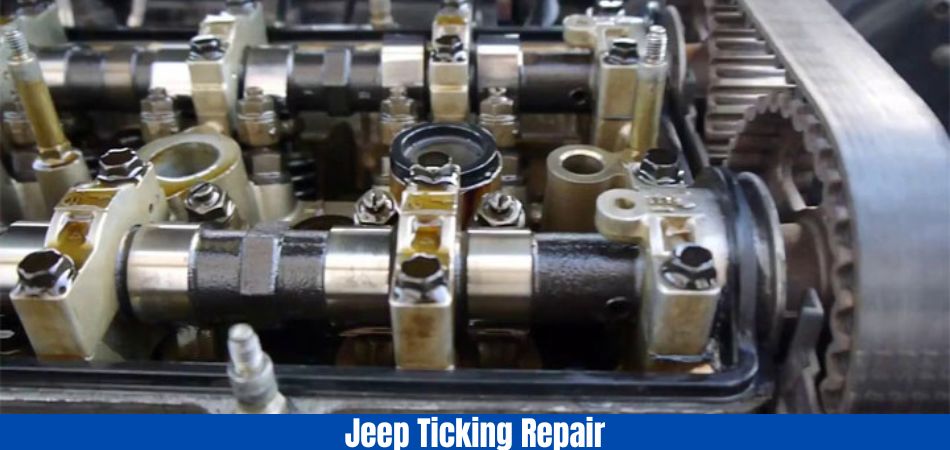
If a clicking noise occurs, it may indicate that the oil pump is failing. Check the oil pump. Continuing to drive a car with a failing oil pump can damage other components and lead to higher repair costs. In order to stop further damage, it is best to address the situation as soon as you can.
4. Worn Hydraulic Lifters
It’s well-known that 4.0 Wranglers often experience ticking and clicking lifters, but it’s important to note that this is different from an injector rattle. The injector rattle can be annoying and can vary in loudness.
Many Wrangler owners ignore the lifter-tick noise, but it’s caused by a gap between the pushrod/camshaft and the lifters, which can wear out over time. To fix it, the cylinder head needs to be rebuilt with new lifters, which can be expensive. If you can tolerate the noise, it’s not harmful to the engine and may not require immediate attention.
5. Exhaust Manifold Blow
The exhaust manifold is a potential source of constant clicking or ticking noises, particularly during cold startups. The noise may be similar to a metronome and in sync with the engine’s RPM. Loose or broken manifold bolts cause this by allowing exhaust gases to escape and creating the clicking or ticking noise.
6. U- Joint
Jeep Wranglers have four universal joints (U-joints). One on the front axle’s ends, one on the front driveshaft, and one where the rear driveshaft joins the rear differential. A worn U-joint will produce a clicking noise as it rotates.
U-joints can wear out quickly due to a lack of lubrication. If the U-joint breaks, it can cause damage to brake lines, transmission lines, or the drive shaft. It’s essential to address this issue as soon as possible as it can cause damage.
The U-joints contain miniature, pin-shaped bearings that can dry out if they lose lubrication. If this happens, People may hear a distinct clicking noise with each rotation of the drive shaft.
7. CV joint
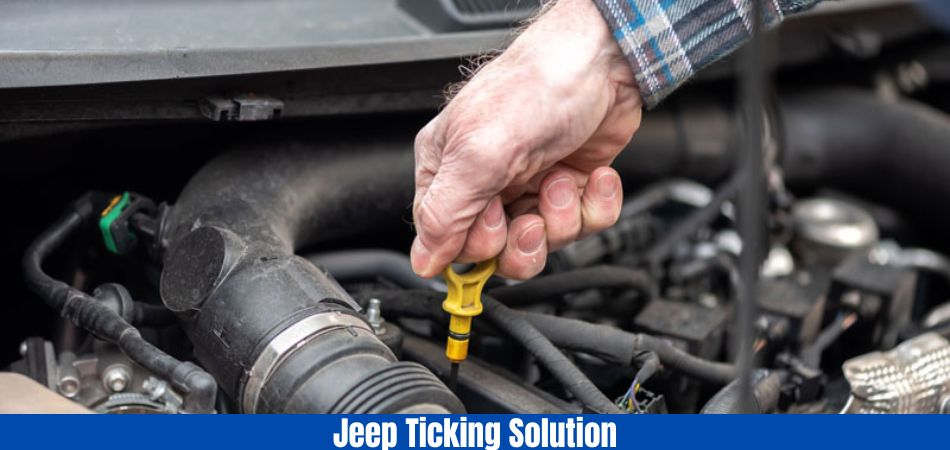
Another common cause of clicking and ticking noises while driving is a worn CV joint. This is particularly common in vehicles with independent front suspension (IFS) and can be exacerbated by a raised suspension. This can change the angle of the CV joint, causing it to lose flexibility and “climb over itself” during extreme off-roading or when there are tire lifts.
When a truck’s suspension is modified to raise the vehicle, the frame and body move higher, away from the differentials. This increases pressure on the CV joint and can cause it to start clicking and ticking before it eventually breaks.
8. Stones
Driving on dirt roads often results in a clicking noise, especially if you use AT (All-Terrain) or MD (Mud Terrain) tires with an aggressive tread pattern. The wider spacing between the rubber lugs on these tires can make it easy for small stones and debris to get trapped.
This can cause a clicking sound as the stone or debris makes contact with the pavement or tarmac. Often, by the time you realize it’s just a stone or debris, it has already been worn down by friction against the road surface. Similarly, a nail in your tire can also produce similar noise.
Why Are Your Jeep Making Ticking Noise When Accelerating?
There are several possible causes of a ticking noise coming from your Jeep when you accelerate. There could be a simple issue such as a loose heat shield or exhaust manifold bolt. You may encounter a problem with the lifter or camshaft, or you may encounter something more serious.
It is likely that a loose heat shield or exhaust manifold bolt is responsible for the ticking noise you hear when the engine is cold. It is expected that the noise will disappear as the engine warms up. In the event that it does not, it is time to take your Jeep to a mechanic for further examination.
There may be a faulty lifter or camshaft causing the ticking noise when the engine is hot. Professional assistance will be required to resolve this issue. You should not ignore this problem – take your Jeep to a mechanic as soon as possible.
Why Does Your Jeep Grand Cherokee Make Ticking Noise When Idling?
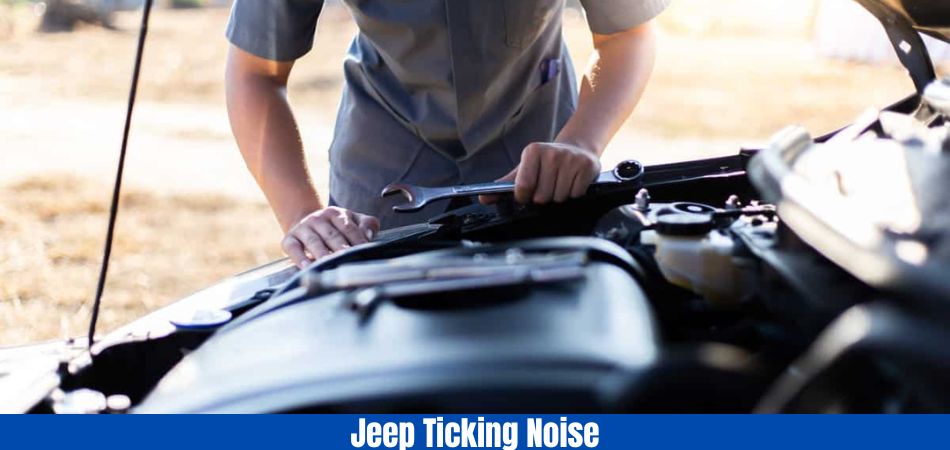
Those of you who own a Jeep Grand Cherokee may have noticed a ticking noise when the vehicle is idling. When this occurs, it can be extremely frustrating and even worrying, as the source of the noise is unclear. In any case, you don’t need to worry too much about it, as this is a fairly common problem that can be easily resolved.
A loose heat shield is likely to be the cause of the ticking noise. In order to protect the engine from excessive heat, the heat shield is located on the exhaust system. Heat shields are prone to becoming loose over time and making noise as they do so.
The good news is that it is relatively easy to fix a loose heat shield. All that needs to be done is to locate and tighten the bolts that hold it in place. For assistance in finding the bolts, consult your owner’s manual or take your vehicle to a qualified mechanic.
You should no longer hear any ticking once you have tightened the heat shield. A mechanic will be able to diagnose and resolve the problem if it does not, in which case there may be another issue at play.
Why Are Jeep Making Clicking Noise When Turning?
Whenever you turn your Jeep, you may hear a clicking noise, which indicates that something is amiss with your CV joints. Your axle shafts are connected by CV joints (constant velocity joints) which allow them to flex during rotation. Their wear and tear can lead to a variety of problems over time.
It is possible that your CV joints may be causing the problem, but there are a few things you can do to determine if that is the case.
You can begin by turning your steering wheel while the Jeep is stationary. If you hear a clicking noise, the CV joints are almost certainly to blame.
Second, examine the boots covering the CV joints – if they are split or damaged in any way, that may be the cause of the noise.
If you are still unsure what is causing the noise, or how to resolve the issue, we recommend that you take your Jeep to a qualified mechanic for diagnosis and repair.
Why is My Jeep Making a Clicking Noise?

There are a number of reasons that your Jeep Cherokee may be making a clicking noise.
To begin with, you should check the oil level and quality in order to determine whether there is any contamination or debris in the oil.
Ensure that the engine’s valve train is not damaged or excessively worn if the oil appears clean and is at the correct level. The cause of a clicking sound in an engine can often be attributed to this problem.
Your Jeep Cherokee may also be experiencing a clicking noise as a result of worn out spark plugs. The deposits and debris that build up on spark plugs over time may cause them to misfire and make a clicking sound.
As well as reducing the efficiency of your engine, worn out spark plugs may also damage your engine over time if they are not replaced.
It is likely that one of the many moving parts in the engine’s drivetrain is malfunctioning if you have ruled out these potential causes of a clicking noise in your Jeep Cherokee. It is not uncommon for these components to eventually fail or make strange noises as they are subjected to great amount of stress and wear and tear over time.
You should take your vehicle to a qualified mechanic or dealership for further diagnosis and repair if you suspect this may be the case.
What Can Cause a Ticking Sound While Driving?
When you hear a ticking sound while driving, you should take note and determine what the cause may be. While driving, a ticking noise can be caused by a number of different factors, and it is important to identify the source of the noise so that the problem can be resolved.
During driving, a ticking sound may be caused by a misfire in the engine. It is likely that one or more of your engine’s cylinders are not firing properly if you experience misfiring. An ignition coil that is worn out or a dirty spark plug can cause this problem.
The exhaust of a misfiring engine will usually be black in color, and the engine will run rough. You should have your engine checked by a mechanic as soon as possible if you suspect that it is misfiring.
There is also the possibility of an exhaust leak causing a ticking sound while driving. Any point along the exhaust system may experience an exhaust leak, such as the manifold or the point at which the pipes connect to the muffler.
In addition to allowing harmful fumes to enter your vehicle’s cabin, exhaust leaks pose a serious safety hazard. In the event that you suspect that your vehicle has an exhaust leak, it should be repaired promptly by a qualified mechanic.
As a final note, loose hardware in the suspension or drivetrain can also cause a ticking noise while driving. Various factors may contribute to this, including loose bolts, worn bushings, and worn bearings.
You should have your vehicle inspected by a qualified technician if you hear a ticking sound coming from underneath, so they can determine if any loose parts need to be tightened or replaced.
How Do You Get Rid of Lifter Ticking Noise?
You can try a few things to fix a ticking lifter noise if your car is making one.
The first step is to check your oil level and ensure that it is full. It may be necessary to add a thicker weight of oil in order to quiet the noise if that is the case.
To eliminate any build-up that may be contributing to the noise, you can also use engine treatments such as STP or Sea Foam.
Additionally, if none of these solutions are successful, the lifters may need to be replaced.
How To Fix the Ticking Noise on Your Jeep?
It is quite easy to resolve the ticking noise in your Jeep. There is only one drawback: it can be somewhat costly.
Generally, ticking noises are caused by expensive problems. If you need assistance fixing your Jeep, the best advice we can offer is to find a professional mechanic and allow them to diagnose the problem.
You may be able to fix some of the problems yourself. With a bit of tutorial, you can have a new oil filter installed within minutes, for example, installing a new oil pump is quite easy.
Ticking noises are caused by a variety of factors, and attempting to resolve them on your own may just compound the issue.
How To Prevent the Ticking Noise on Your Jeep?
In order to prevent the ticking noise on your Jeep, regular maintenance is the best course of action. A professional mechanic should perform this type of service on a regular basis.
Your Jeep may never reach the tick noise point of its life cycle if it is regularly serviced and inspected for faults.
You should also make sure that whenever you replace parts on your Jeep, that you obtain the spares from Jeep in order to ensure that your Jeep remains sound.
The importance of this cannot be overstated, especially when dealing with compatibility issues. A Jeep with an aftermarket air filter might be causing the annoying tick sound, as we have already mentioned.
How Much It Costs to Fix the Ticking Noise in A Jeep?
You will have to pay quite a bit of money to have your Jeep fixed if it is making a ticking noise. Many people prefer to sell their Jeeps rather than repair them when they develop the ticking noise.
Depending on the problem, you will need to spend between a few hundred dollars on a replacement air filter, and upwards of $2000 on a replacement cylinder head.
The excitement of owning a Jeep is unmatched, however, the ticking noise can dampen the experience.
Please feel free to share this guide with others if you think it may be helpful for them. The only thing you need to do is click on one of the share buttons below!
Conclusion
Now you might have got the answer: why is my jeep making a ticking noise? Identifying the specific component responsible for the ticking sound in a Jeep Wrangler can be challenging.
The most effective approach is to methodically inspect each of the components listed above to identify the source of the sound. Common culprits for the ticking sound in Wranglers include faulty lifters/rockers, insufficient or low-quality oil, and exhaust manifold leaks. However, it is also possible that a simple object such as a stone stuck in the tire could be causing the ticking sound.
Keep Reading Why Is My Jeep Wrangler Leaking Oil? Reasons Explained!
FAQ’s
How can I determine whether low oil pressure is to blame for my ticking noise?
Usually, when the engine is idling or running at low RPMs, a ticking noise brought on by low oil pressure can be heard. To ascertain if this is the issue, check the oil level and, if necessary, add more oil.
Will my engine be harmed by a ticking sound coming from worn valve lifters?
If neglected, a ticking noise brought on by worn valve lifters can eventually result in engine harm. It’s critical to replace the valve lifters as soon as possible.
Can a ticking sound be caused by a worn timing chain?
Unable to keep the crankshaft and camshaft in proper synchronization due to wear and tear, a worn timing chain can indeed make a ticking noise.
How can people fix wearing U-joints that make a ticking noise?
The ticking noise made by worn gears is often caused by a lack of lubrication. It will be necessary to lubricate or replace the U-joints in order to fix this.
Can debris in the tire treads make a ticking sound?
Yes, debris trapped in the tire treads can cause a ticking sound as the debris makes contact with the pavement or tarmac. This is more commonly heard when driving on rough or off-road terrain. The sound will usually be in sync with wheel rotation.







Leave a Reply